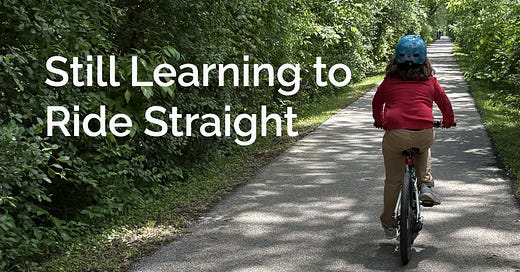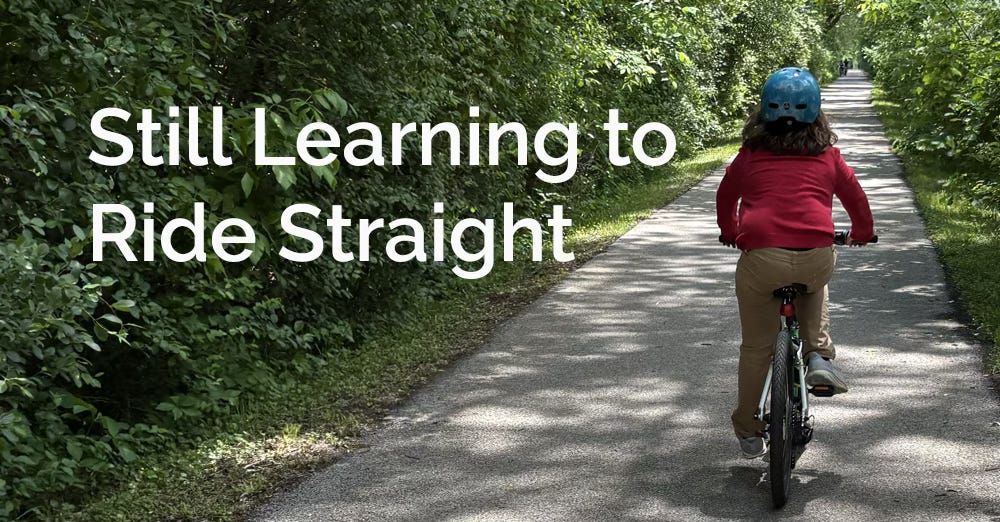Foreword
Five years out, it’s easy to forget the fog of it all. The days blurring together. The constant recalibration of risk. The way silence settled into homes once filled with music, mess, and motion.
And yet, that forgetting is part of the ache.
What Katie offers here is not just a memory. It’s a recognition. A moment on a bike trail that gently returns us to what we endured—not to relive it, but to remind us of how far we’ve come, and what it still costs to show up for each other now. In these paragraphs, you’ll hear the voice of a mother, a community builder, and a truth-teller, naming what many of us still carry beneath the surface.
At The Warm Hearth, we believe in lighting candles for the things we’re still healing from. This is one of those candles.
-Brian Piñon
This weekend, I rode the Fox River Trail with my kids, winding our way from Elgin to Dundee along the river’s edge. The breeze was kind. The trees were full and green. My boys rode with the easy confidence that comes from practice and time. They’re such competent riders now—confident, route-savvy, aware of others. That didn’t happen by accident. I gave them responsibility early. I let them take appropriate risks. I helped them co-regulate through big emotions instead of asking them to squash them down. And it’s paid off. But as we pedaled, I remembered what it was like to ride that same trail five years ago, in the strange, suspended summer of 2020.
Back then, biking had become an escape for so many—one of the few safe ways to be outside, to move our bodies, to see other people from a distance. The trail was like a highway, packed with families and solo riders and kids learning balance for the first time. Mine were so small then. They had not really mastered riding in a straight line, veering left and right, wobbling wherever their attention wandered. The adults in our party were all a little on edge—worried my kids would get hurt or cause someone else to fall. And yet, we kept riding. We kept showing up.
I know it’s not March. There’s no commemorative candle to light in late May. But summer was strange, too. The heat didn’t soften the isolation. I barely remember what it was like to step into a restaurant and pull a mask from my bag. I can’t always summon the sound of empty schools or the smell of hand sanitizer on everything. But sometimes, the memories come in flashes—like sunlight through leaves—brief and disorienting. And I realize how much of that time still lives under the surface. I think we’re still healing. I think we don’t always know how to talk about it.
I find myself wanting to apologize for bringing COVID up again. I know people are tired of it—tired of remembering, tired of grieving, tired of the way it warped time. But these moments sneak up on us. Healing isn’t something we calendar. It’s something that surfaces in the middle of a bike ride, or a graduation, or a quiet afternoon when the air smells like it did in 2020. We don’t return to the past to dwell. We return to honor the parts of us that made it through.
What I can’t stop thinking about is the tension between how easily it can feel like it never happened, and how deeply it changed us. That juxtaposition makes it hard to name what we lost. It’s like trying to trace a scar that healed without ceremony—still tender, but invisible. We all carry those moments: of fear, of resilience, of unexpected beauty in the middle of unimaginable stress. And we carry them unevenly. Some of us walked through fire. Some of us fell apart quietly. Some of us are only now realizing how heavy it was, because we finally have the space to feel it.
A friend of mine is graduating from high school this month—part of the Class of 2025. He was in seventh grade when the world shut down. Think about that: his entire high school experience has been shaped by a before-and-after he didn’t choose. There’s a mark left on this generation, too, one we may not fully understand yet. It’s in how they relate to one another, how they measure safety, how they hope. And it’s on us—those of us who remember the wobble and the fear and the weight—to help them name it. To make space. To keep the hearth warm—a place we all can rest when the ride gets hard.
What lingers for me most is the cost. The grief I still carry has less to do with headlines and more to do with what it meant to parent through that time—so much responsibility, so little support. The loneliness of it. The silence of days filled with needs and noise but so few adult voices. After the lockdowns eased, I realized just how much I had been holding, alone. And I made a quiet promise to myself: to name that loneliness, and to do something about it. To build community intentionally. To find my people, and hold them close.
At The Warm Hearth, we try to live by a simple commitment: to keep showing up for each other. To be a steady light when the world flickers. Sometimes that looks like dinners around a long table. Sometimes it looks like an essay that gently reminds us what we’ve lived through. And sometimes, it’s as simple as holding space—for grief, for memory, for grace.
My boys ride straighter now. They’re still growing. We all are. But I hope I never forget how much it meant to be out there with them five years ago, learning to navigate the path with care, watching strangers make space for our unsteady lines. We were never riding alone. We’re still not. The trail is still here. And we are still healing.







Beautifully written as always. These 5 years since covid have gone by quickly. Reading Katie's prose reminds me of that summer: face masks, anxiety about going outside, chasing, catching and returning chickens to where they belonged, taking online classes at Yale, helping a former colleague find a judge to perform a wedding ceremony, and attending that ceremony in the front yard. It was also the time where my sister, brother in law and I moved my mom and her husband into assisted living AND then that place closed ranks so none of us could visit or come inside and my mom and her husband had to isolate. A new normal came into being: one where too many people died. A time of reckoning after George Floyd's murder. That covid summer ended with me finding and adopting Barkley and discovering his fear aggressiveness and ability to open refrigerator doors.
So, thank you for allowing space for us all to never forget what that summer was. Each of us has had a different experience that needs to be honored.